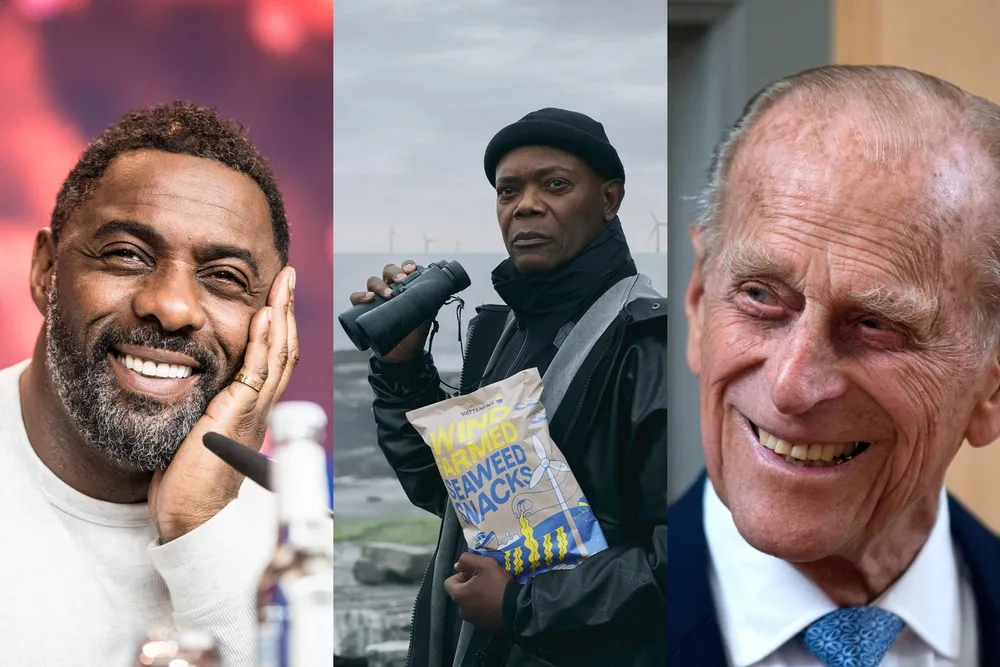Seven celebrity interventions in wind power – from 'motherf*cking wind farms' to 'absolute disgrace'
Several bona fide acting legends, Prince Philip and America’s former 'most trusted man' have all had high-profile run-ins with the wind industry over the years, some more positive than others

After Hollywood icon Samuel L. Jackson was pulled into promoting “motherf*cking wind farms,” we look at this and six other celebrity interventions in the wind power industry – from strong supporters to sworn enemies.
This is certainly one of the most unique and attention-grabbing interventions a celebrity of his calibre has made in the wind industry to date, but it is far from the only one, for or against.
Idris Elba (for)
Elba’s father was from Sierra Leone and he is a "brand ambassador" for the country.
Together with a relative of a former president of the resource-rich nation, Elba co-founded an infrastructure development firm, Sherbro Alliance Partners (SAP), which is aiming to regenerate Sherbro Island into an eco-friendly “smart city”.
In June, SAP announced that the country’s parliament has ratified a landmark public-private partnership to kick-start development of the project.
Elba said previously that the goal is to create a “culturally diverse international city that blends African tradition, dynamism, and pride with state-of-the-art infrastructure and services, where development sits in harmony with sustainability.”
Ralph Fiennes (against)
Another British Hollywood star to have made headlines in the wind industry in recent years is Ralph Fiennes.
Fiennes – who counts the Harry Potter film series, Bond films and The Grand Budapest Hotel among his acting credits – was joining protests against onshore substations for one of the world’s largest offshore wind hubs in the North Sea.
Those substations are planned on the Suffolk coast of eastern England to support the £6.5bn ($8.6bn) 3GW East Anglia Hub being developed by ScottishPower Renewables, a subsidiary of Spanish renewables giant Iberdrola.
Greta Thunberg (against)
Had Greta Thunberg intervened in support of a wind farm it would seem so par for the course for the Swedish climate activist as not to merit inclusion on this list. That she was arguing for one to be torn down was more surprising.
Prince Phillip (against)
"I was surprised by his very frank views,” said the wind power executive, plainly unaware of Prince Philip’s reputation as someone who did not mince his words.
This came after the royal let then-Infinergy CEO Esbjorn Wilmar know exactly what he thought about wind turbines: “Absolutely useless, completely reliant on subsidies and an absolute disgrace.”
"He said, 'You don't believe in fairy tales do you?'" recalled Wilmar. "He said that they would never work as they need back-up capacity."
Brian Cox (for)
Yet another UK acting legend, Brian Cox, was part of a celebrity campaign in support of wind energy in the early 2000s.
That was organised by what was then the British Wind Energy Association, now RenewableUK, to drum up support for the country's fledgling wind power industry.
“If we are serious about tackling climate change and securing our energy sources for the future we must harness the great power of the wind,” said Cox.
The actor, who has seen a resurgence in fame in recent years for his depiction of Logan Roy on the HBO’s hugely successful comedy-drama Succession, said that his native Scotland was “well placed to lead the renewables revolution, let’s not stand in its way.”
Cox had some musical accompaniment in that campaign from Coldplay bassist Guy Berryman and Franz Ferdinand lead singer Alex Kapranos, both also Scots.
Walter Cronkite (against)
Known as the “most trusted man in America,” Walter Cronkite was a US broadcasting giant who anchored CBS Evening News for two decades.
At the start of the 2000s, the veteran journalist was one of many to raise objections to a 130-turbine Cape Wind project planned in Nantucket Sound off the Massachusetts coast.
Cronkite, who owned a summer home in nearby Martha’s Vineyard, featured in an advertising campaign run by the Alliance to Protect Nantucket Sound, raising concerns about the harm turbines could do to “fishing and recreational boating and, very particularly, to wildlife.”
However, he later rowed back from his criticism, saying that he had not realised his concerns were already looking into the concerns that he had raised as part of the consenting process.
"My alacrity in accepting an invitation to make a comment was partly my own dropping of my reportorial role of investigating a situation before making a comment," he said. "I did not do it, and it was my fault."